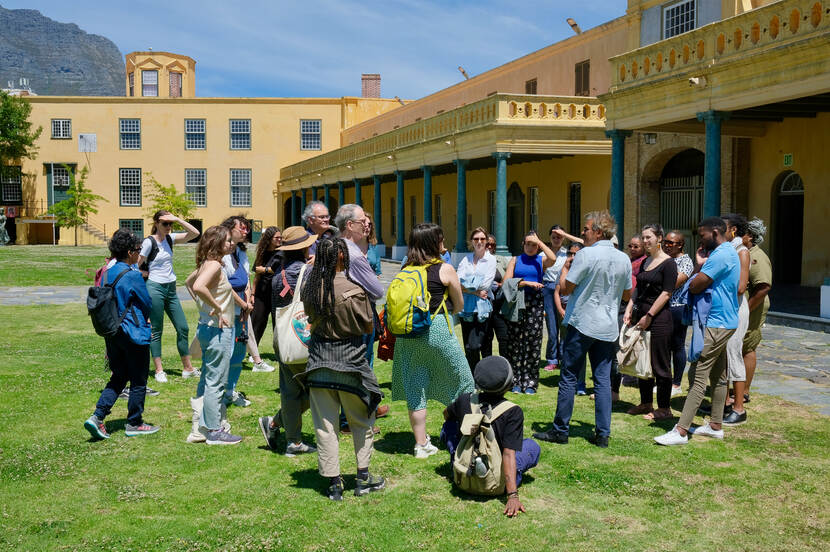Sharing Stories on Contested Histories: ‘This makes the exchange especially appealing to new participants’
Weblog
This autumn, the Cultural Heritage Agency of the Netherlands (RCE) organises the seventh edition of the unique Sharing Stories on Contested Histories exchange programme - this time in a revamped format! Remco Vermeulen, senior advisor on International Cooperation on Moveable Heritage at the RCE, gives a preview of how this will look. A discussion on breaking free from your bubble, more space for the dark side of built heritage, and a brand new alumni network.

Museums across the world recognise the challenges regarding contested heritage. After all, how do you join up conflicting perspectives on our past? And how do you present emotionally-charged collections and stories in a way that is inviting and inclusive? It’s a tough job. Since 2018, the RCE, together with the Reinwardt Academy, has been organising the Sharing Stories on Contested Histories exchange programme, aimed at young heritage professionals worldwide, to reflect together on contested heritage in this day and age. November will mark the seventh edition.
Leaving your bubble
This edition will be slightly different from the last one, Remco says. ‘During the exchange, participants can discuss very difficult heritage topics in an accessible way. This is highly topical, as many museums have contested heritage in their collections, or are located in a colonial building. We bring together specialists from all kinds of countries and backgrounds who are struggling with the same themes, challenging them to leave their own “bubbles”. To hear each other’s views, discuss freely and thus gain new insights. The principle remains the same, but this year, we are focused entirely on museum professionals. Previously, heritage specialists at organisations without collections also participated. But it’s collections that ensure that participants bring practical experience and their own challenges. This edition will focus on just that issue.’
Our own current issue
Indeed, each participant will soon be asked to submit their own case study. And these cases then become the basis of the programme. Remco says: ‘Previously, participants mainly worked on Dutch cases centred on contested heritage. But now we ask them to bring their own topical issue, on which the participants will advise each other. That way, things directly touch on their working reality and they can immediately apply them in their own museums after the programme.’
A building with a painful past
The seventh edition will also focus on built heritage. Remco says: ‘Besides museum collections, built heritage sometimes has a very fraught aspect, such beautiful canal houses from the 17th century where slavery left a painful mark. There are also are museums all over the world that are themselves located in colonial buildings. How do you deal with this? How do you raise awareness? And how, as a museum, do you provide insight into the different sides to the history? This year, we’re paying attention to built colonial heritage in the programme as well.’
Brand new network
There is another striking change. This year, the exchange programme is gaining a brand new alumni network. This was something wanted by both the participants and the RCE, says Remco. ‘We wanted the programme to be much more than a series of online sessions and an intense week of meetings. Participants sometimes did keep in touch, but now we are going to actively facilitate this. This will allow lasting connections to be created - between participants themselves, between participants and the RCE, and between the organisations working together on the programme.’
Private platform
What will this look like? ‘We’re working with some participants from the 2024 edition to cover the coming period’, says Remco. ‘In any case, there will be a private LinkedIn group. It will be a platform to discuss things, share current insights and ask questions. We are also thinking of organising several webinars every year, devised and delivered by alumni themselves.’
Closer to one another
Remco expects that the alumni network will make the exchange especially appealing to new participants. This will help the programme grow in significance. In addition, for the programme the RCE will work more closely with the Colonial Collections Consortium, in which the Rijksmuseum, the World Museum, Museum Bronbeek, the NIOD Institute for War, Holocaust and Genocide Studies, and the RCE are represented. ‘That brings the participants and these organisations even closer together. We are hugely looking forward to the revamped seventh edition of the programme. It will be a wonderful opportunity for anyone with challenging heritage issues looking for a broader view and new insights.’
Seventh edition
This spring, interested parties registered for the seventh edition of Sharing Stories on Contested Histories via this site. The exchange programme takes places from September to November 2025. It is aimed at budding career museum professionals from the 24 RCE partner countries. Part of the application includes submitting your own case. As in 2024, the exchange will consist of online sessions and a meeting week in the Netherlands.
Remco Vermeulen is senior advisor for international cooperation on museums and collections at the RCE. He facilitates knowledge exchange and capacity building programmes between the Netherlands and RCE partner countries. He does this as part of the International Culture Policy and for the Colonial Collections Consortium. The Sharing Stories on Contested Histories programme is a prominent long-term project here. Alongside his work at the RCE, Remco is an external PhD student at the Erasmus University Rotterdam. He is researching the way in which young Indonesians use Dutch colonial spaces in Indonesian cities.